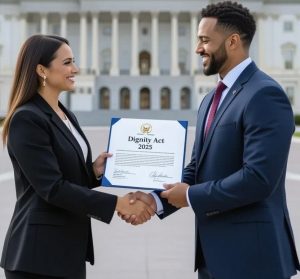 The U.S. foreign-born population hit a record 47.8 million in 2023. That number keeps climbing, putting pressure on an outdated immigration system last overhauled in 1996. Lawmakers in Congress now face heated debates over how to handle this reality. From border walls to legal pathways, the stakes feel higher than ever in 2025.
The U.S. foreign-born population hit a record 47.8 million in 2023. That number keeps climbing, putting pressure on an outdated immigration system last overhauled in 1996. Lawmakers in Congress now face heated debates over how to handle this reality. From border walls to legal pathways, the stakes feel higher than ever in 2025.
Proposals like the Dignity Act of 2025 aim to blend security with compassion. This bipartisan bill, reintroduced by Reps. Maria Elvira Salazar and Veronica Escobar, pushes for stronger borders while offering a seven-year renewable status to long-term undocumented residents. It sparks hope for families split by policy gaps. For many navigating these changes, firms like Escoto Law provide crucial guidance on what shifts mean day-to-day.
Key Proposals on the Table
Congress introduced several bills this year to tackle immigration head-on. The Dignity Act stands out as a comprehensive effort. It calls for physical barriers, advanced tech, and more personnel at the border. At the same time, it sets up a “Dignity Program” for those who have stayed in the country for more than five years. Participants would check in every two years, pay fees, and prove community ties to stay. After seven years, they could seek permanent status if borders prove secure.
- Border Security Boost: Funds for walls, sensors, and 100,000 new detention beds to speed up processing.
- Asylum Overhaul: Tougher fraud checks and faster hearings to cut backlogs that stretch years.
- Worker Visas Update: Recapture unused visas to ease shortages in tech and agriculture.
Not every idea wins broad support. The New Democrat Coalition’s framework adds smart tech investments and economic growth via legal labor. Yet, Republican-led bills like the American Tech Workforce Act tighten H-1B rules, aiming to protect U.S. jobs. These differences highlight a core tension: How much enforcement versus opportunity?
Political Positions: A Divided Landscape
Democrats often champion pathways to citizenship as a moral and economic win. They point to Dreamers, young adults brought here as kids, who now face uncertainty without reform. “We need to fix the broken asylum system and grow our workforce,” says Rep. Gabe Vasquez, a New Dem leader. His group pushes for fair enforcement without mass deportations, arguing it boosts GDP by $900 billion over a decade.
Republicans stress security first, viewing open borders as a crisis. With President Trump’s return, calls for mass deportations echo loudly. Project 2025, a conservative blueprint, urges slashing asylum access and ending birthright citizenship debates. “Secure the border, stop illegal immigration,” Rep. Salazar declares in bill texts. Supporters say this restores rule of law, but critics warn of family separations and court battles.
“The Dignity Act offers humanity and security in one package,” notes Rep. Escobar. “It restores dignity to those navigating a broken system for decades.”
Independents and moderates bridge the gap. Bipartisan talks, like those in the 2024 Senate deal, link funding to policy tweaks. Yet, progress stalls. Why? Partisan gridlock, fueled by election cycles, keeps bills bottled up. As one X post quipped recently, “Trump stopped the flow without a giant bill, proving enforcement works solo.” But data shows crossings dropped due to mixed factors, not miracles. Understanding these dynamics often starts with education, and resources like those from political science programs highlight how studying policy equips advocates to shape balanced solutions.
Potential Legal Consequences: Wins and Risks
New laws could reshape lives overnight. A citizenship path might legalize 11 million undocumented folks, easing fears of raids. Families could reunite without visa lotteries. Economies in states like California and Texas, where immigrants are one in five residents, would thrive with stable workers.
But pitfalls loom large. Stricter asylum rules risk violating international treaties, inviting lawsuits. Mass deportations? They’d cost $170 billion, per Brookings estimates, and clog courts. Immigration judges already face 3 million case backlogs. “Rushed policies lead to chaos,” warns a recent AILA report. Plus, ending programs like TPS strands long-term residents in limbo.
- Positive Shifts: Faster green cards reduce family separations and boost tax revenues.
- Legal Hurdles: Challenges under the 14th Amendment could halt birthright changes.
- Economic Hits: Deporting workers empties farms and factories, hiking food prices.
Attorneys see ripple effects everywhere. High-skilled reforms, like the H-1B tweaks, might flood tech with talent but squeeze American grads. “Clients worry about unintended bars to status,” shares an expert from Reddy Neumann Brown PC. Balanced views, they say, prevent a system that punishes the vulnerable while ignoring real threats.
Why It All Matters: Beyond the Beltway
Immigration touches every corner of American life. Think of the nurse from Mexico staffing your ER or the engineer from India coding your apps. Reforms decide if they stay contributors or forced exiles. In 2025, with crossings at decade lows yet tensions high, getting this right builds trust. Wrong moves? They deepen divides, fuel protests, and drain budgets.
Communities crave clarity. A Texas farmer told El Paso Times reporters, “We need hands to harvest—deport them, and crops rot.” On X, users debate fiercely: One viral thread praised enforcement wins; another mourned “hunting Latinos in their beds.” Facts cut through noise, reform could add jobs, cut deficits, and honor Dreamers’ grit.
As debates rage, one truth stands. Immigration reform in 2025 isn’t just policy. It’s about weaving newcomers into our story without tearing the fabric. Will Congress choose division or dignity? The answer shapes tomorrow. For those caught in the crossfire, trusted voices like Escoto Law remind us: Knowledge empowers amid uncertainty. Let’s push for laws that lift all boats.
